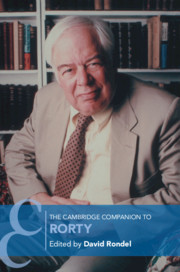Book contents
- The Cambridge Companion to Rorty
- Cambridge Companions to Philosophy
- The Cambridge Companion to Rorty
- Copyright page
- Contents
- Contributors
- Abbreviations of Works by Rorty
- Introduction: The Unity of Richard Rorty’s Philosophy
- 1 Rorty’s Metaphilosophy: A Pluralistic Corridor
- 2 After Metaphysics: Eliminativism and the Protreptic Dilemma
- 3 Rorty and Classical Pragmatism
- 4 A Pragmatism More Ironic Than Pragmatic
- 5 Rorty and Semantic Minimalism
- 6 Returning to the Particular: Morality and the Self after Rorty
- 7 Rorty’s Political Philosophy
- 8 Tinkering with Truth, Tinkering with Difference: Rorty and (Liberal) Feminism
- 9 Rorty’s Insouciant Social Thought
- 10 Rorty and National Pride
- 11 Rorty on Religion
- 12 Rorty: Reading Continental Philosophy
- 13 Rorty’s Literary Culture: Reading, Redemption, and The Heart’s Invisible Furies
- 14 Wild Orchids
- Bibliography
- Index
- Cambridge Companions to Philosophy
12 - Rorty: Reading Continental Philosophy
Published online by Cambridge University Press: 13 April 2021
- The Cambridge Companion to Rorty
- Cambridge Companions to Philosophy
- The Cambridge Companion to Rorty
- Copyright page
- Contents
- Contributors
- Abbreviations of Works by Rorty
- Introduction: The Unity of Richard Rorty’s Philosophy
- 1 Rorty’s Metaphilosophy: A Pluralistic Corridor
- 2 After Metaphysics: Eliminativism and the Protreptic Dilemma
- 3 Rorty and Classical Pragmatism
- 4 A Pragmatism More Ironic Than Pragmatic
- 5 Rorty and Semantic Minimalism
- 6 Returning to the Particular: Morality and the Self after Rorty
- 7 Rorty’s Political Philosophy
- 8 Tinkering with Truth, Tinkering with Difference: Rorty and (Liberal) Feminism
- 9 Rorty’s Insouciant Social Thought
- 10 Rorty and National Pride
- 11 Rorty on Religion
- 12 Rorty: Reading Continental Philosophy
- 13 Rorty’s Literary Culture: Reading, Redemption, and The Heart’s Invisible Furies
- 14 Wild Orchids
- Bibliography
- Index
- Cambridge Companions to Philosophy
Summary
This chapter focuses on Rorty’s engagements with Heidegger, Derrida, and Foucault. It argues that, however much he enjoyed these encounters, Rorty’s philosophical views were largely unaffected by them. He tended to endorse what could be assimilated to his own Deweyan pragmatism and reject the rest. In this way, Rorty endorses Heidegger’s diagnosis of the history of European philosophy, while disavowing his criticism of modernity and his nostalgia for an authentic language of Being. He denounces Foucault’s supposed commitment to anarchism and revolution as incompatible with his preferred Deweyan social democratic politics. Only his writings on Derrida provide evidence of deepening understanding of and sympathy with a philosophical project irreducible to his own. Overall, Rorty refuses to accept any philosophical invention on the part of these thinkers. Derrida’s deconstructive argument in favor of an elusive quasi-metaphysics of difference, and Foucault’s genealogies of present institutions and ways of thinking are either ignored or denounced as residues of the tradition they seek to escape. Rorty characterizes each of them as essentially private thinkers, “ascetic priests” who aspire to stand apart from the herd and to be in touch with a reality more profound than the life they share with others.
- Type
- Chapter
- Information
- The Cambridge Companion to Rorty , pp. 261 - 283Publisher: Cambridge University PressPrint publication year: 2021

